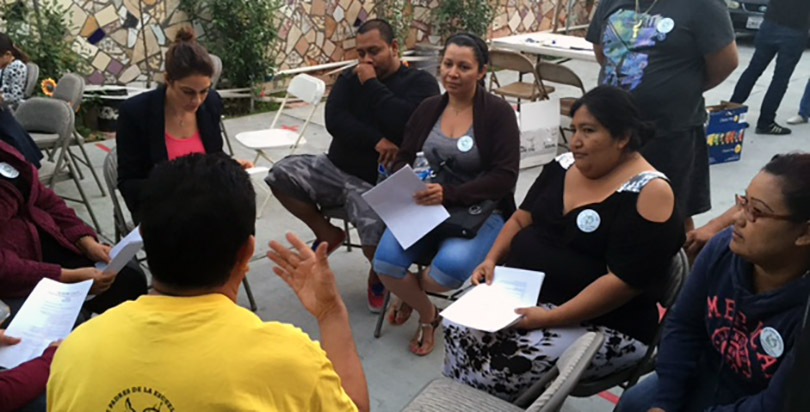LA Unified has
rejected a parent petition to take over a failing elementary school in South Central Los Angeles, reversing district policy and essentially asserting that no California school qualifies under the state “
parent trigger” law.
Parents of
20th Street Elementary School were informed of the district’s rejection
in a letter late Saturday, the last day the district had to notify the parents. They had hoped to be able to take over the school and possibly create a charter through the state’s
Parent Empowerment Act, or parent trigger, which has been
used twice to help under-performing LA Unified schools.
“We are so disappointed, all the parents are really upset,” said Guadalupe Aragon, one of the parents who
started the petition drive. “We just want our children to have the same opportunities to get to college that other children in the district have, and this was our only way to do it. We are very angry.”
After two years of trying to get changes at the school, and dropping the threatened trigger by the parents at least once, the 20th Street Parents Union
filed again last month to take over the school with 57 percent of the families (the parents of 342 students) signing a petition.
“This is shameful,” said former California state senator Gloria Romero, who authored the law, after reading the district’s letter. “They have a brand new superintendent and she is harking to the past, in a sense. Where is the leadership? It’s supposed to be a new game with LA being unified. This does not bode well for the spirit of the law.”
The law was passed in 2010 and used at two LA Unified schools in 2013. That year, statewide tests were suspended in anticipation of computerized tests based on the Common Core State Standards. The following year former Superintendent John Deasy argued that the district was exempt, for one year, from the parent trigger by a federal waiver from the federal No Child Left Behind law that allowed LA Unified and seven other California school districts to create their own metrics for academic performance in the temporary absence of statewide standards.
One of the first things interim Superintendent Ramon Cortines did when he took over was to
reverse Deasy’s edict and lift the ban on parent triggers. King worked under both Deasy and Cortines.
King and her staff met with parents only five days before the letter was sent out rejecting their petition. The meeting last Monday, held at district headquarters, was called by King and also attended by representatives of
Partnership for Los Angeles Schools, which was brought in by the district to see if it might be a solution for the parents.
"It would be in the best interest of reform for LA Unified to accept the parent petition and not fight the parents. The sacrifice is that they are losing more time for kids."
Joan Sullivan, CEO for
Partnership for Los Angeles Schools, said she was invited to attend the meeting at the district to offer some sort of solution for 20th Street. Partnership was offering a hybrid of a charter and traditional school as an option, which they have done in 17 schools over the past eight years in the South Central LA area.
“Parents are asking for a choice, and we could offer a good option,” said Sullivan said. “We take on whole schools and support them with the current student body and most of the staff and use the parent involvement and voice.”
At last week’s meeting, the district “never told us that our school may not be eligible or that there was any problem with our petition,” Aragon said.
In a statement Monday to LA School Report, King said, “Some parents were dissatisfied with our efforts and filed petitions under the Parent Empowerment Act to change the governance structure of 20th Street Elementary School. Because the law doesn’t apply to this situation, we returned the petitions. However, we remain committed to working with parents to address all concerns in a timely manner.”
The letter to the parents, written by LAUSD General Counsel David Holmquist, gave four reasons why the parents’ petition was denied, including some of the same reasoning that Deasy used.
First, the letter said the school doesn’t have an
Academic Performance Index under 800 as the law requires. That’s not true, according to
Gabe Rose of
Parent Revolution, a group that helps parents organize and take over a failing campus. He said the API score of the school is based on the past three years of scores, and 20th Street has a score of 765. There is no API score for this school year because the state has suspended testing.
Second, the letter notes that a school must fail to show
Adequate Yearly Progress (AYP), but the district letter states that 20th Street has in fact improved, based on state data released in December. However, the AYP no longer measures test scores, because of the suspension in testing, but simply measures the attendance of students during the test. LA Unified released data showing that 20th Street has 96.29 percent attendance compared to 95 percent for the district.
The Anaheim School District used a similar argument regarding AYP to to fight a parent trigger at Palm Lane Elementary School, but it was
rejected by a judge last summer. The district has appealed the ruling.
Third, the district said that a federal waiver granted to the California Office to Reform Education, or CORE, exempted the district and “relieved LAUSD from the requirements of taking improvement actions,” according to the letter by Holmquist. But the U.S. Department of Education, which granted the waiver and was asked to clarify its conditions, stated at the time that neither the federal government nor any other entity can override a state law.
In its fourth reason for rejecting the 20th Street petition, LA Unified said the parents didn’t state whether they wanted to have a solution within the district or create an independent charter school. But according to the state trigger law, parents’ petitions are not required to state their preferences. Aragon and other parents said they always had the intention of entertaining charter management organizations to help their school.
One of those is
Magnolia Public Schools, led by CEO Caprice Young, a former LA Unified school board member. She said, “We absolutely want to support the families of 20th Street Elementary School, and we know we have a phenomenal program that can help them. We like working with proactive families, and this shows that LAUSD does not want parents to be involved, otherwise they would support this.”
Young said she remembered when Cortines reversed Deasy’s initial stance against the triggers, and said, “LAUSD has a moral obligation to uphold this.”
Romero said the district shouldn’t waste taxpayer money fighting parents on this issue, especially since she created the law to avoid just that. The law firm of
Kirkland & Ellis has offered to handle the legal issues for parent triggers at no cost throughout the state.
Mark Holscher, a partner at Kirkland & Ellis, said his firm is helping the parents in communities that couldn’t afford legal representation on their own. He said he cannot discuss any plans yet that the 20th Street parents may have about pursing a case against LA Unified but did say the situation is very similar to the one they represented in Anaheim.
“The LA Unified School District sent our clients an email on Saturday and said they were inspired by the courageous conversations of the parent leaders, but those are empty words,” Holscher said. “What they’ve done is refuse to even consider the parent trigger law. Parents tried to work with the district on the last petition. LAUSD didn’t honor what they said they would do. They can’t ignore the Parent Empowerment Act.”
In response, King said, “LA Unified is committed to partnering with all parents of 20th Street Elementary School to provide our students with high quality learning opportunities and to help them succeed. We are continuing to strengthen instructional supports and enhance social-emotional and parent-engagement programs that are essential to the school community. We look forward to working with the school community to build a unified vision that addresses the needs of all students.”
Romero said the district must do more. “Ultimately, the parents and schools will prevail,” Romero said. “LAUSD needs to read the law. It would be in the best interest of reform for LA Unified to accept the parent petition and not fight the parents. The sacrifice is that they are losing more time for kids. It’s shameful.”
This article has been corrected to note the year that John Deasy requested the one-year exemption, which was in 2013, and that the Anaheim School District had used the AYP argument in its rejection of the Palm Lane trigger, not the CORE waiver argument.


;)
